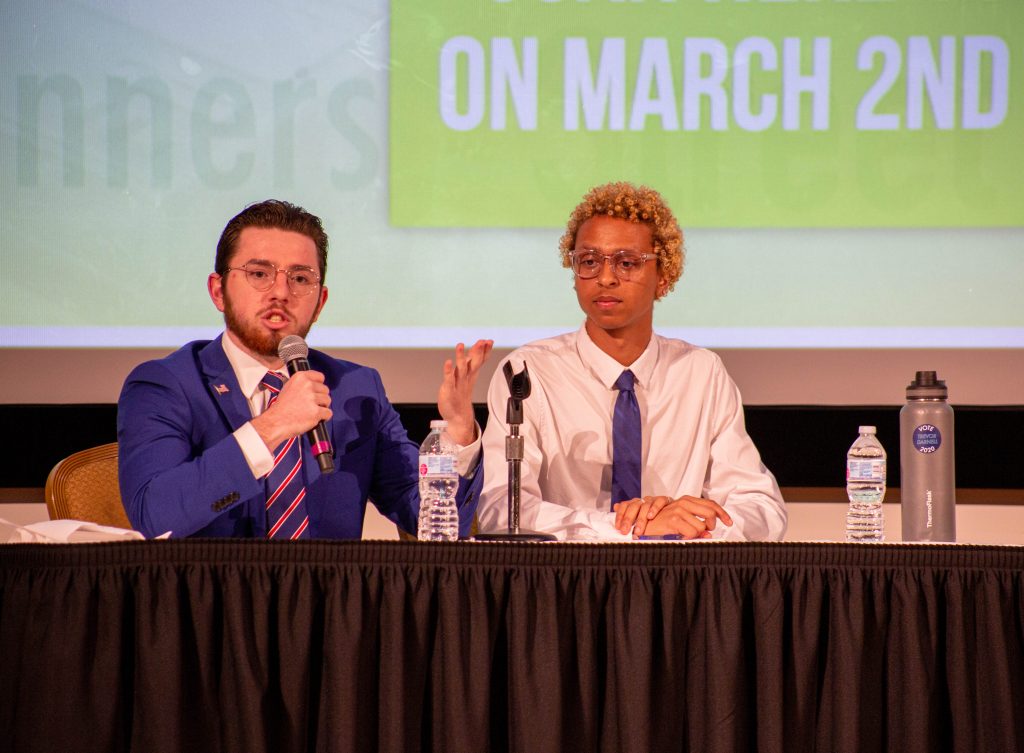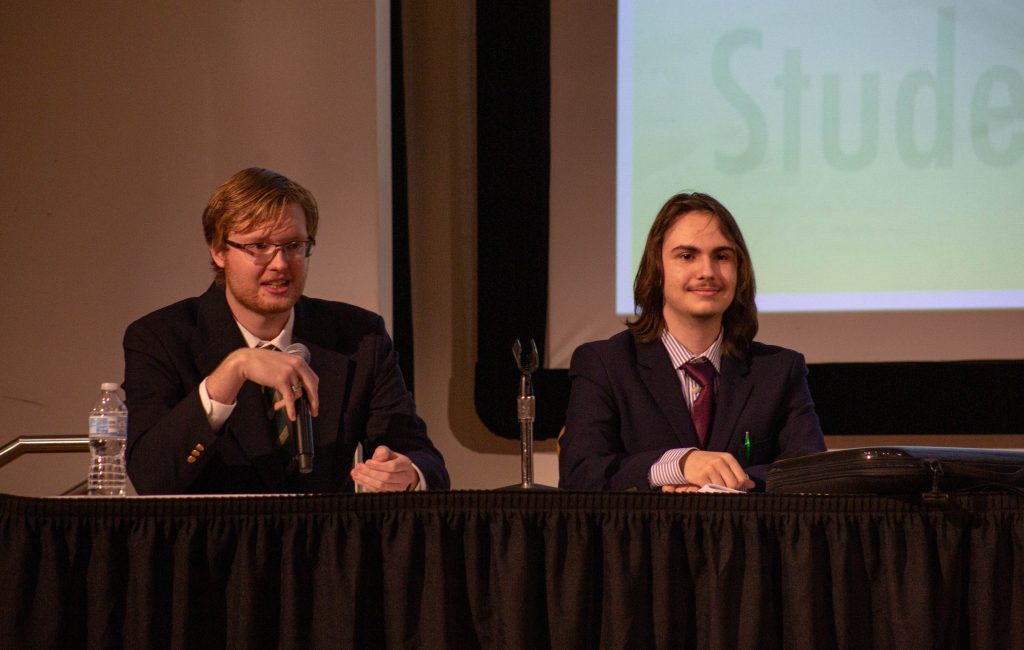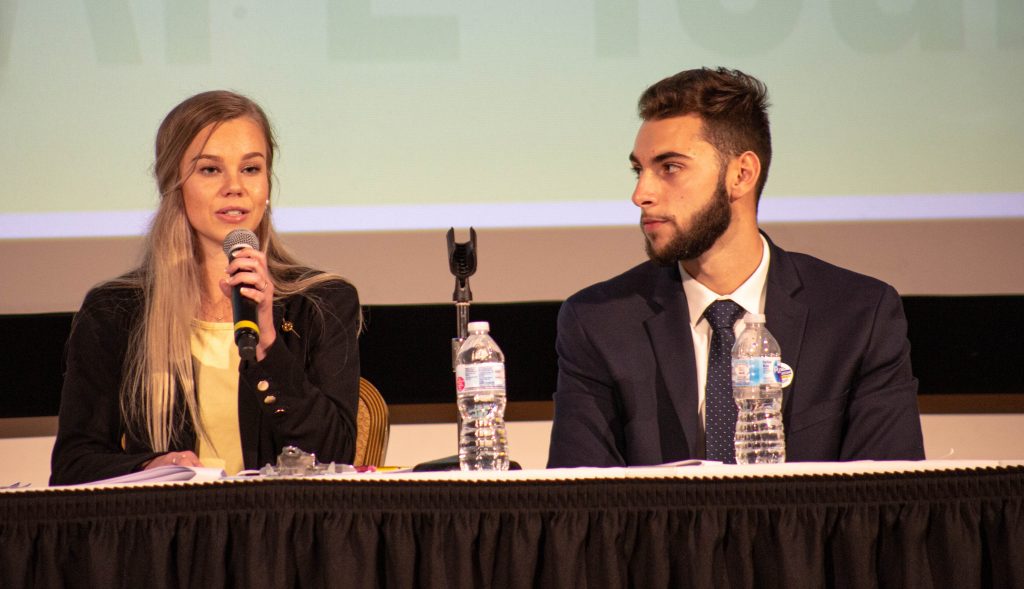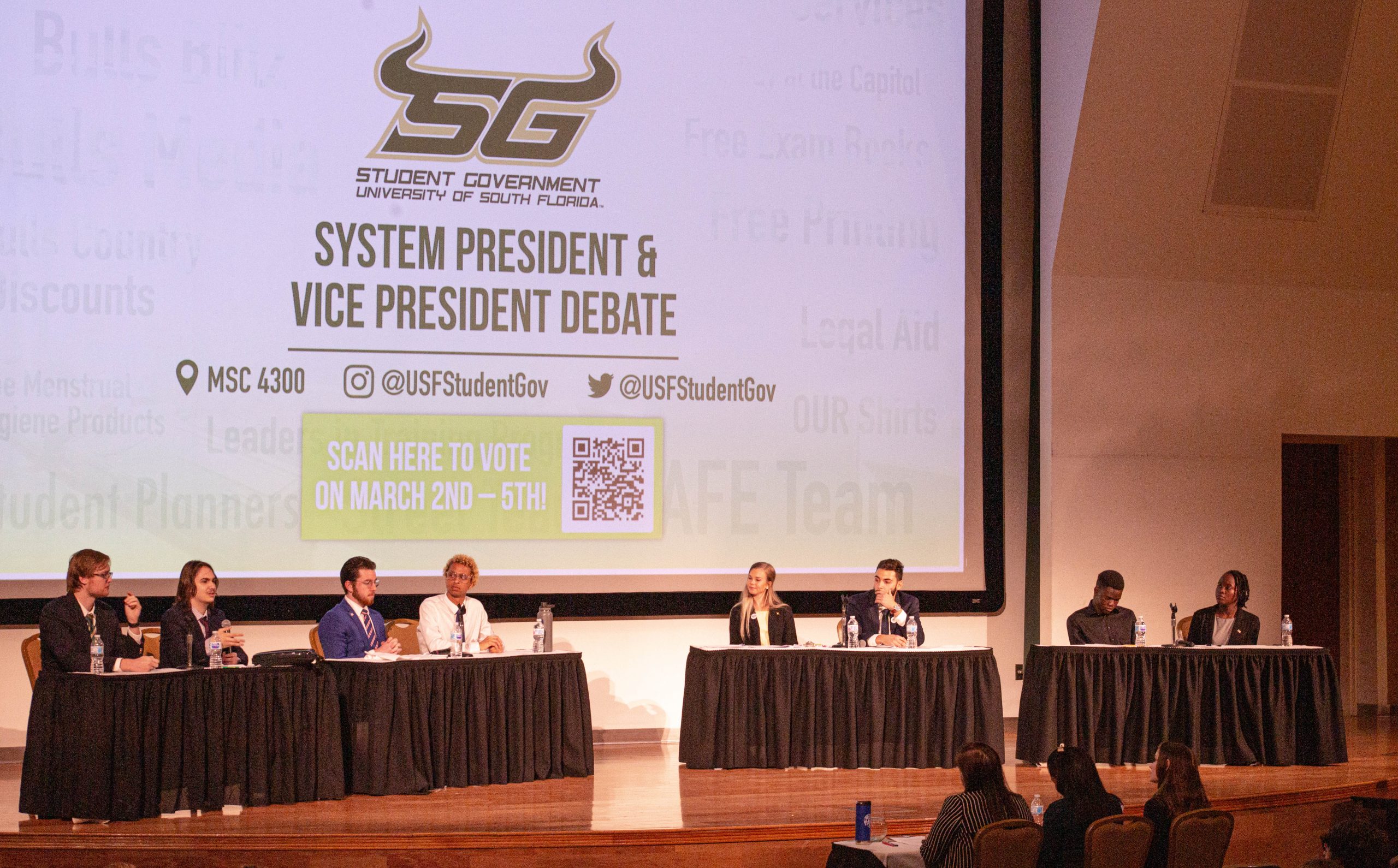Starting today, students across all three campuses of the University of South Florida system will cast their votes for one of four tickets running to be the first president and vice president of a consolidated Student Government.
By Carrie Pinkard
One ticket is advocating for Student Government-subsidized housing.
One is calling for improved mental health services across the university system.
One wants to establish what it calls a “first-generation college student transition program.”
Another wants to launch an inter-campus bus transportation system.
All four are seeking your vote this week to become the first student body president of a consolidated University of South Florida.
The tickets are:
- Siblings Kuchari and Hyelampa Thlala Kolo. Kuchari is a junior quantitative economics major, and her brother, Hyelampa, is a freshman majoring in computer science.
- Claire Mitchell, a biomedical science and international studies double major, and Gustavo Spangher, a sophomore accounting major.
- Trevor Martindale, a sophomore political science major, with running mate Darnell Henderson, a junior graphic design major.
- Peter Radulovic, a double major in biomedical and political science, and Thomas Knudsen, a civil engineering major.
According to the Student Government constitution, the president’s responsibilities will include nominating and appointing justices to the SG supreme court; overseeing all Student Government agencies; and signing off on all constitutional amendments passed by the 60-member system-wide senate.
Those sweeping powers will probably come with a big salary, but the figure has not yet been decided.
This year, the student body president on the St. Petersburg campus earns $10,968.75 annually, and the vice president, $8,325.
On the Tampa campus, the student body president and vice president are each budgeted $16,789 a year, according to Gary Manka, Tampa’s director of SG advising, training and operations.
After a few withdrawals from the race and rearranging of tickets, the candidates took to the stage for the first and only presidential debate on Feb. 24.
They spoke to a crowd of about 75 in the Oval Theater at the Marshall Student Center in Tampa, hoping to prove that they were the right ones to represent more than 48,000 USF students.
The debate was moderated by the three incumbent student body presidents from each campus: Tampa’s Britney Deas, St. Petersburg’s Jazzy, and Sarasota-Manatee’s Isabelle Starner.

Thomas Iacobucci |The Crow’s Nest
As St. Petersburg students, Martindale and Henderson were the only ticket not from USF Tampa. In a debate that centered around consolidation, this distinction stood out.
“We think we can provide a unique perspective in this consolidated system,” Martindale said. “I have personally sat on consolidation statutes committees and consolidation constitution committees, and I am very familiar with the consolidation process.”
Martindale and Henderson are running on a “4 All” platform. The play on words represents how the duo plans to work for all of USF. The four pillars of their platform are students, the environment, health, and consolidation.
Martindale and Henderson’s origins from the St. Petersburg campus made them a minority group on stage, but Kuchari and Hyelampa Thala Kolo represented another minority group: international students.

Thomas Iacobucci | The Crow’s Nest
The Kolo siblings are from Nigeria, and they’re running on a platform that focuses on inclusion.
“USF is very rich in different students and has a large international population,” Kuchari Kolo said. “Being able to harness that power of international connections would be a great benefit to the university as a whole.”
Another unique part of the Kolo platform is the idea of Student Government-subsidized housing.
“The role of a government is to make people’s lives easier,” Kuchari said. “As a Student Government, we want to subsidize student housing. The rent rate is always increasing, and it would really help to have a stable, long-term rent rate.”
Many of the candidates spoke about the importance of maintaining the individual identities of each campus after consolidation.

Thomas Iacobucci | The Crow’s Nest
Radulovic, an SG senator on the Tampa campus, said that if elected, he wants to see the three campuses making a lot of their own decisions.
“In my opinion, we should enumerate as many powers as possible to the local campuses and keep the power close to your home campus,” Radulovic said. “I don’t think that one campus on the other side of Florida should be telling you what to do.”
Radulovic also pointed out that while each campus should retain much of its autonomy, the campuses should share the amenities and perks they each offer.
One of his initiatives calls for creating a bus transportation system that would allow students to travel among the three campuses.
“We want students to be able to move between campuses more readily and more easily so that we can use each other’s resources but not infringe on each other,” Radulovic said.

Thomas Iacobucci | The Crow’s Nest
Mitchell, another SG senator on the Tampa campus, said she is excited about consolidation and the opportunities it will bring to students.
She said she sees mental health services growing on the Tampa campus and wants to be sure those services spread to the branch campuses as well.
“I know lots of times it can be limited in terms of how much time the counselors have and how many students they can take in,” Michell said. “I just want to make sure that all campuses have the opportunity to have that large wellness center in order to have access to mental health services.”
Mitchell said she also wants to promote inclusivity for minority groups across all the campuses.
“I think the first step is to listen to these groups and hear their suggestions,” Mitchell said. “I believe the LGBT community, as well as others, need a larger representation as far as the resources that are there for them.
“We’re not here to separate groups, but combine (them) into one.”
Henderson, who serves as SG’s design and marketing director on the St. Petersburg campus, also echoed the importance of diversity and inclusion.
“In the fall semester of 2019, we only had five (first-time-in-college) black students admitted to our campus, and that’s something that we need to immediately resolve,” Henderson said.
One of the pillars of the Martindale/Henderson campaign is to establish what the candidates call a “first-generation college student transition program.” This program would admit first-generation college students into a six-week summer acclimation program to get them comfortable on campus.
All of the candidates emphasized how they want to make each of the campuses feel included under a consolidated USF, but not all of them had visited all three campuses.
Kuchari Kolo said she will dedicate the fall and spring semesters of next year to visit the St. Petersburg and Sarasota campuses. She said she and her brother would be traveling among the campuses because in-person conversations “hold more weight.”
Martindale said serving on consolidation committees has given him the chance to go to all three campuses and meet Student Government officials from each of them.
“I’ve been able to work with Student Governments in Tampa and Sarasota,” Martindale said. “I’ve been able to meet and talk with them and understand the bill that makes up their Student Governments. I think that’s very important because the system president will be working with other Student Governments, so knowing them and knowing their names is very important.”
Radulovic said he splits his time between the Tampa and Sarasota campuses but doesn’t have much experience in St. Pete. He said he wants to “bring local issues to a federal platform.”
Spangher acknowledged that “I’ve never been to the Sarasota or St. Pete campuses.”
Spangher said, if elected, he and Mitchell plan to take a “listening tour” — similar to USF system President Steve Currall’s — so they can hear the needs of students from the three cities.
Whoever is elected president this year is taking on triple the campuses and triple the responsibility of any previous SG president.
Candidates are hoping that the significance will drive students to the polls. But USF’s voter turnout has been historically low across the system.
Last year, 3,677 voters turned out for USF Tampa’s spring SG elections. That’s approximately 8 percent of the student population.
In St. Petersburg’s spring SG elections, only 574 of 4,908 eligible students voted, or about 12 percent.
Voting opens for USF students on Monday, March 2, and closes Thursday, March 5. On-campus polls are open from 9 a.m. to 5 p.m., but students unable to make it to campus can vote online at https://eballot4.votenet. com/usf/casLogin.cfm.
This story was updated on Monday, March 2, to include the salaries of USF Tampa’s SG president and vice president.



